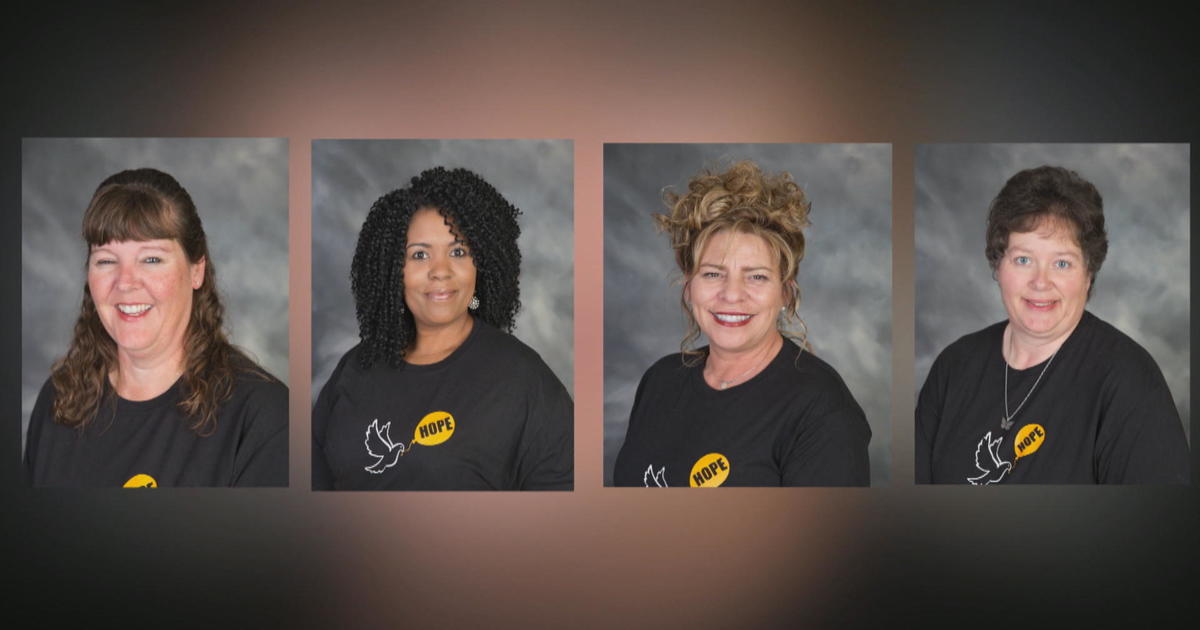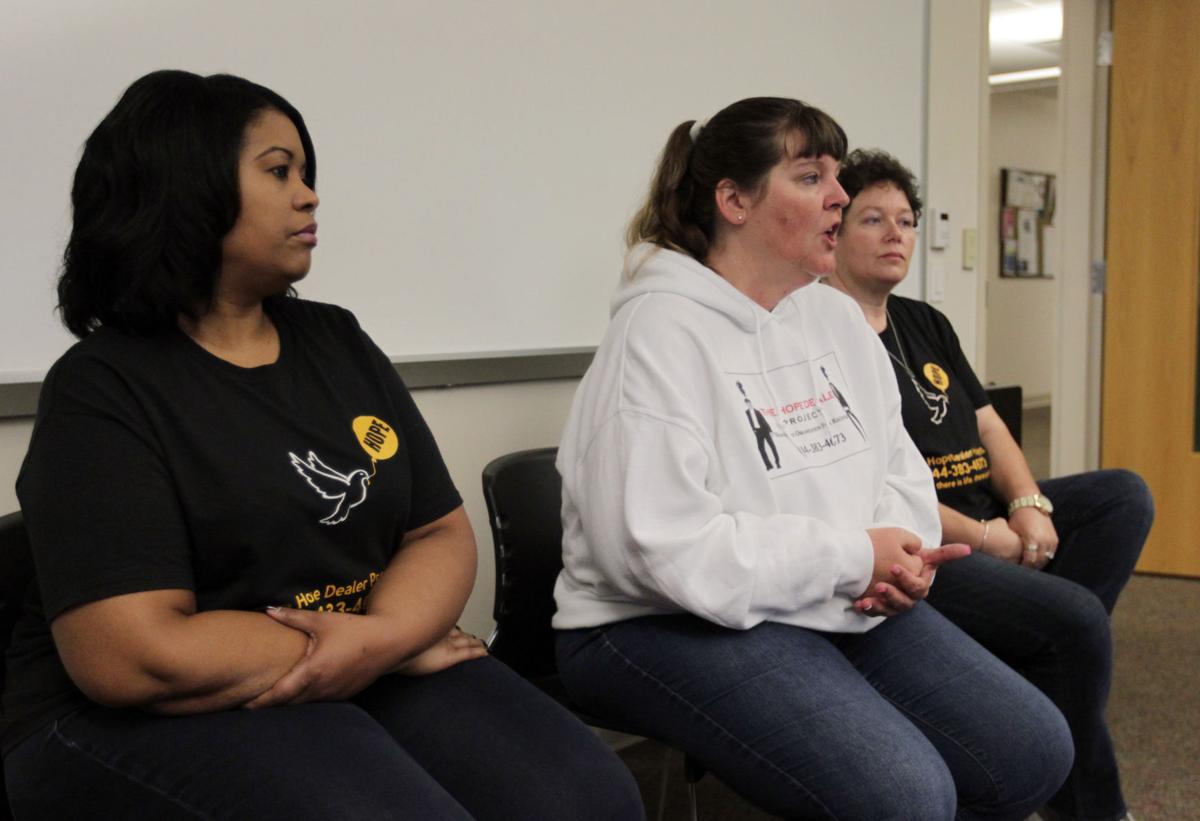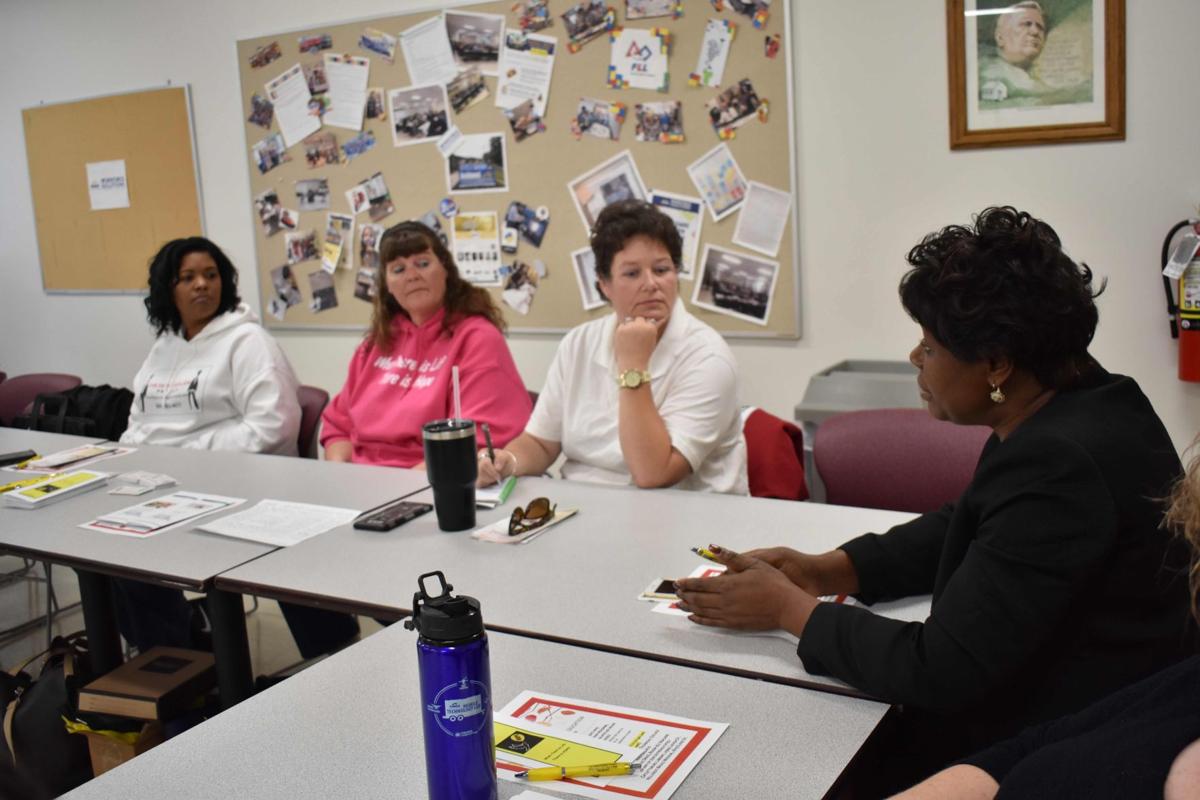
Four women living in Martinsburg, West Virginia, have come together as dealers only they’re dealing hope to addicts who have hit rock bottom. Tina Stride, Kristie Plotner, Tara Diggs-Mayson and Lisa Melcher bonded over their shared experiences dealing with an addicted family member and decided to do what they can to help others in their community struggling with heroin addiction. Living in a small town of just 18,000 people, they are in the epicentre of the heroin epidemic ravaging the country. Illegal drugs come into the city on Highway 81, which some call Heroin Highway. The town’s young adults wander the streets, some with their children tagging along, on their way to their next fix. Heroin is not hard to find. At a “drug house” in town, the front door is propped open with a chair. Dozens of people were arrested in March for trafficking heroin, including a 24-year-old who was considered the kingpin. But it seems business is still booming.“Our town is dying,” says Melcher, whose home has become the central station for the grassroots group they’ve dubbed: “the Hope Dealer Project.”Addiction has personally devastated Melcher.

She is still mourning her daughter Christina, who studied to be a nurse assistant and had two children of her own. Christina had been on and off heroin for a decade. She’d gone through detox more than half a dozen times, but she never stayed clean for more than a year. Her boyfriend overdosed and died, and that set her back. But in May she was doing well. Her children were living with grandparents, and she was living at a sober house out of state and waitressing. She was 78 days clean. She spoke to her mother on Mother’s Day and was looking forward to coming home and helping the Hope Dealers. Then, three days later, she made a terrible choice to use just one more time. She died at age 32 of pure fentanyl, an opioid many times stronger than heroin. Lisa is now raising her 12-year-old grandson. That story is much too common in this valley town. But when addicts seek help, it’s not easy to find. The town has no drug rehab facility, many users don’t understand the red tape of Medicaid, and if they find an out-of-town facility they are often told there is simply no room available. In February 2016, at the town’s first meeting of Nar-anon, a 12-step program for families of addicts, the four women decided to join forces to help other families. By December, the Hope Dealer Project had a Facebook page, a toll-free number, and non-profit status.

“We’re the new dealers in town, we’re the dealers of hope,” Melcher says. The hotline connects addicts seeking help with the four brazen, can-do ladies ready to spring into action. When someone says they are ready to get clean, the women act fast.“We know that there is a short period of time that their mind is clear enough that they want help,” says Stride. They figure out what insurance the client has. Most are on Medicaid, so far gone they haven’t been working. They call their contacts to find a suitable program with space available, pick up the “client,” sit with them while they get a professional medical clearance and drive them sometimes six hours away to the nearest detox or rehab centre that has a bed available that very day. The addict may have severe withdrawal symptoms all the way, including vomiting, diarrhoea, restless legs, chills, sweats, and insomnia. They are often scared, ashamed or full of second thoughts. Stride says the addicts worry, “How can you tell me I can get better with what I’ve done? I’m worthless. I’ve cheated, I lied, I stole from my family.” She shoots right back, “Your past is your past, you can’t change it.

Just show how good you can be. You’re going to have to fight hard, dig deep.”The Hope Dealers pay for gas, a few plane tickets to get to or from rehab, a bicycle for a recovering client so she could get to work, cigarettes whatever their clients need if are truly working to quit drugs. Some of the money comes from donations, and a lot of it comes from their own pockets. Stride is a government contract negotiator, Mayson is a telecommunications specialist at the Veterans Administration, Plotner transports hospital patients and works at the local school. Melcher quit her job in real estate management when her daughter died, and is currently looking for work. Money is tight, but they are on a mission. The addicted are often homeless, with a history of dealing drugs, stealing or prostituting for drug money. There is no judgment here. “Every addict gets to rock bottom, and sometimes rock bottom has a basement,” Melcher says. She remembers the day when she found Christina in the bathroom with a bottle of water, a cotton ball and half a straw, but her daughter convinced her she was not seeing what she thought she was seeing. Christina got angry and said she was only polishing her toenails. Nodding off in the middle of a conversation was just her being tired. A swollen hand was nothing, she just slept on it. And always her daughter would plead for another $10. Melcher’s eyes were up when she recalls the fights. Stride, who calls heroin “the devil’s juice,” says her son got in trouble for experimenting with pills in 10th grade. By age 19 he was an addict. He called her from rehab begging for a plane ticket to come home, telling her they were mistreating him. “I let him come home and he relapsed. I didn’t know he had it lined up and waiting for him.” Now she tells parents to let those calls go.

I enabled my son to stay as a drug addict, giving him money, let him come to my house to eat. I finally said no more.” Today her son is 26 and he’s one year clean, she announces proudly. He’s living in Florida, away from the hometown dealers, and finally enjoying life with his wife and 7-year-old daughter. The Hope Dealers have all been through it so they can relate to the parents of these addicts. “It’s an emotional rollercoaster,” says Plotner, whose daughter lived under a bridge until the day she told her mom she was ready to get clean. Plotner is also raising her grandchild. Parents often go through it alone, she says. “When you tell someone your child is a heroin addict, there’s a stigma,” Plotner says. “Your friends don’t throw a party for you.”The Hope Dealers tell parents, who are usually exhausted from years of dealing with their addicted child, to go home and sleep. They’ll handle it. “I wish there had been one person who had done that for me,” Plotner says. When the kids come home from rehab, parents may think the terrible ordeal is over. The Hope Dealers explain that it isn’t. They warn parents that 99 per cent will relapse at least once.
“We tell the family they need to learn all about addiction,” Lisa says. “They are not coming home and being perfect. It’s not a cure-all. They’ll work it forever.”The Hope Dealers explain that recovering addicts need encouragement if they are going to stay clean. The county has responded to the opioid crisis by opening a recovery resource centre, but addiction counsellor Peter Callahan finds the proactive style of the Hope Dealers impressive, and he sends clients to the foursome. “They jump into action, regardless of the time of day or night,” he says. “They will drive a person, who is dope sick, and they will get them to a detox bed. Others simply say they want to do something these ladies are passionate about actually doing something.”The battle is far from over in Martinsburg. While the death toll in the county is slowing, overdoses are increasing. The Hope Dealers will be on the phones all night talking to worried parents, addicts who aren’t really ready to give up their drugs, and maybe one who says they’re ready to do everything it takes to quit life on heroin. That’s all the Hope Dealers need to hear.

